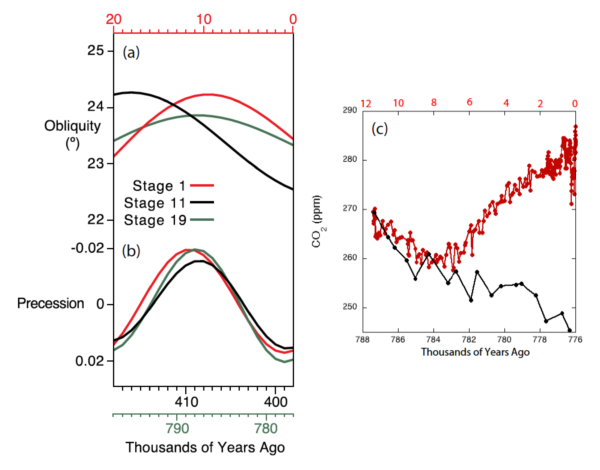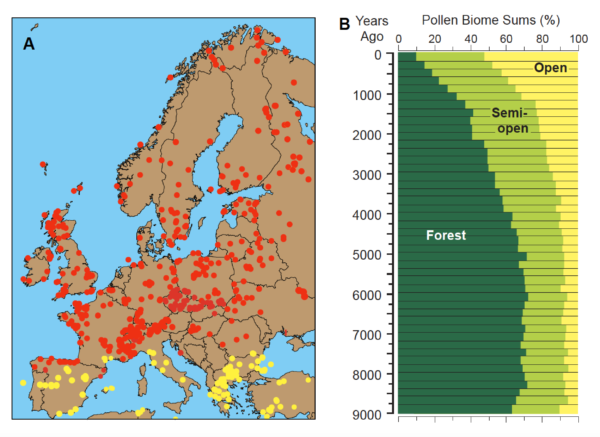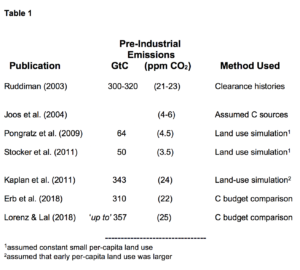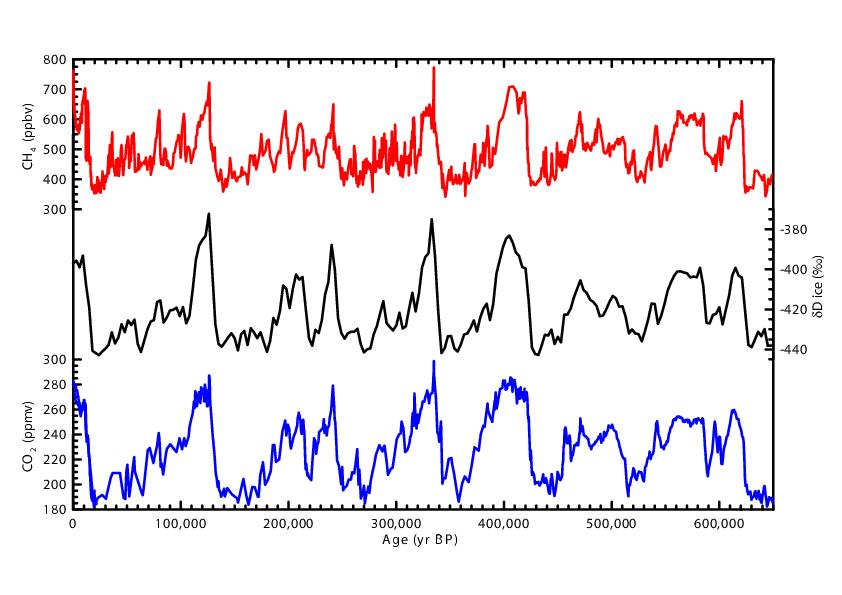Guest article by William Ruddiman
Fifteen years after publication of Ruddiman (2003), the early anthropogenic hypothesis is still debated, with relevant evidence from many disciplines continuing to emerge. Recent findings summarized here lend support to the claim that greenhouse-gas emissions from early agriculture (before 1850) were large enough to alter atmospheric composition and global climate substantially.
Marine isotopic stage (MIS) 19 is the closest orbital analog to the current MIS 1 interglaciation (Tzedakis et al., 2012), with similarly small changes in precession (εsinω) and nearly synchronous peaks in sin and obliquity (Fig. 1a, b). MIS 11 was once claimed to be the closest MIS 1 analog (for example, Broecker and Stocker, 2006), but that claim is now rejected because obliquity and precession peaks in MIS 11 were far offset.

Figure 1 Comparison of (a) obliquity and (b) precession (εsinω) trends during MIS19, (green), MIS11 (black) and MIS1 (red). Based on Tzedakis et al. (2012). (c) CO2 trends during MIS19 (black) and MIS1 (red). CO2 data for MIS 19 are from Dome C (Bereiter et al. 2015). CO2 data for MIS 1 are from Law Dome (MacFarling Meure et al. 2006) and Dome C (Monnin et al. 2001, 2004) for MIS1.
With MIS 11 eliminated as an analog, the focus is on MIS 19. The CO2 signals early in MIS 1 and MIS 19 (Fig. 1c) reached nearly identical peaks of 270 and 269 ppm, after which the MIS 1 value fell for 4000 years but then rose by 20 ppm to a late pre-industrial 280-285 ppm. In contrast, the MIS 19 CO2 trend continued downward for more than 10,000 years to 245-250 ppm by the time equivalent to the present day. This value is consistent with the 240-245 ppm level proposed in the early anthropogenic hypothesis for a natural Holocene world (with no human overprint). The 35-ppm difference between the two interglaciations is close to the 40-ppm Holocene anomaly inferred by Ruddiman (2003).
A GCM simulation of the MIS 19 time equivalent to today by Vavrus et al. (2018) indicates that the low CO2 values would have caused year-round snow cover (indicative of incipient glaciation) in the Canadian Archipelago and over Baffin Island (an area roughly the size of Greenland), as well as other Arctic regions (see also Ganopolski et al., 2014).
Ruddiman (2003) estimated pre-industrial carbon emissions of 300-320 Gt, based on a back-of-the-envelope compilation of the incomplete forest clearance histories then available (Table 1). [One Gt is one billion tons]. That estimate was for a while rejected as too high by a factor of 5 to 10 (Joos et al., 2004; Pongratz et al., 2008; Stocker et al., 2011. However, Kaplan et al. (2011) found that those estimates had been biased downward because they assumed much smaller early per-capita clearance than the large amounts shown by actual historical data. Those estimates also ignored areas that had been cleared and were not in active agricultural use, but had not yet reforested. Adjusting for these factors, Kaplan and colleagues estimated pre-industrial emissions of 343 GtC.
Erb et al. (2017) averaged 7 estimates of the amount of carbon that would currently be stored in Earth’s potential natural vegetation had there been no human activities (910 GtC) compared to the 460 GtC carbon actually stored there today. They attributed the difference of 450 GtC to cumulative vegetation removal by humans (mostly deforestation). With ~140 GtC of clearance having occurred during the industrial era, that left an estimated 310 GtC as the total removed and emitted to the atmosphere during pre-industrial time. In a similar analysis, Lorenz and Lal (2018) estimated pre-industrial carbon emissions of ‘up to’ 357 GtC.
Studies in other disciplines have begun adding direct ground-truth evidence about early clearance. Analyses of pollen in hundreds of European lake cores (Fyfe et al., 2014; Roberts et al, 2018) show that forest vegetation began to decrease after 6000 years ago and reached near-modern levels before the start of the industrial era (Fig. 2). In China, compilations of over 50,000 archaeological sites by Li et al. (2009) and Hosner et al. (2016) show major increases of farming settlements in previously forested areas beginning 7,000 years ago. These extensive compilations support the above estimates of large early anthropogenic clearance and C emissions.

Figure 2. Evidence of early forest clearance in Europe. (A) Locations of cores in the European pollen database. Cores used for pollen summary in B are shown in red (Fyfe et al., 2015). (B) Changes in forest, open, and semi-open (mixed forest and open) vegetation plotted as ‘pseudobiome’ sums.
As this wide-ranging multi-disciplinary evidence has emerged, some scientists continue to reject the early anthropogenic hypothesis. Most of the opposition is based on a geochemical index (δ13CO2) measured in CO2 contained in air bubbles trapped in ice cores. The δ13CO2 index shows the relative balance through time between the amount of 12C-rich terrestrial carbon from the land and 13C-neutral carbon from the ocean. The small 13C decrease in atmospheric CO2 during the last 7000 years has been interpreted as indicating minimal input of 12C-rich terrestrial carbon during that time (Broecker and Stocker, 2006; Elsig et al., 2009). In a July 20, 2018 Scienceonline.org post, Jeff Severinghaus estimated the early human contribution to the observed CO2 rise as “1 to 2 ppm at the most”, or just 5-10% of the recent estimates reviewed in Table 1.

Other scientists (Stocker et al., 2018; Ruddiman et al., 2016) have pointed out that the δ13CO2 index cannot be used to isolate the amount of deforestation carbon unless all significant carbon sources and sinks are well constrained. The compilation by Yu (2011) indicating that ~300 Gt of terrestrial (12C-rich) carbon were buried in boreal peats during the last 7000 years shows that this constraint had not been satisfied in previous studies. Burial of ~300 GtC in boreal peats requires a counter-balancing emission of more than 300 GtC of terrestrial carbon during the last 7000 years, and the discussion above summarizes evidence that pre-industrial deforestation can fill that deficit. Even now, however, carbon exchanges (whether sources or sinks) in non-peat permafrost areas and in river floodplains and deltas during the last 7000 years remain poorly known.
Scientists trying to make up their minds about this still-ongoing debate can now weigh wide-ranging multi-disciplinary evidence for large early forest clearance against reliance on the as-yet poorly constrained δ13CO2 index.
References
Bereiter, B., S. Eggleston, J. Schmitt, C. Nehrbass-Ahles, T. F. Stocker, et al. (2015), Revision of the EPICA Dome C CO2 record from 800 to 600 kyr before present, Geophys. Res. Lett., 42, 542–549.
Broecker, W. S. and T. L. Stocker (2006), The Holocene CO2 rise: Anthropogenic or natural? EOS Trans. Amer. Geophysical Union 87, 27.
Erb, K.-H., T. Kastner, C. Plutzar, C., A. L. S Bais, N. Carvalhai., et al. (2018), Unexpectedly large impact of forest management on global vegetation biomass. Nature 553, 73-76.
Elsig J., J. Schmitt, D. Leuenberger, R. Schneider, M. Eyer, et al. (2009), Stable isotope constraints on Holocene carbon cycle changes from an Antarctic ice core. Nature 461, 507-510.
Fyfe, R. M., J. Woodbridge, and N. Roberts (2015), From forest to farmland: pollen-inferred land cover changes across Europe using the pseudobiomization approach. Global Change Biology 20, 1197-1212.
Ganopolski, A., R. Winkelmann and H. J. Schellenhuber, (2014), Critical insolation-CO2 relation for diagnosing past and future glacial inception. Nature 529, 200-203.
Hosner, D., M. Wagner, P. E. Tarasov, X. Chen, and C. Leipe (2016), Spatiotemporal distribution patterns of archaeological sites in China during the Neolithic and Bronze Age: An overview. The Holocene 26, 1576-1583.
Joos F, Gerber S, Prentice IC, et al. (2004) Transient simulations of Holocene atmospheric carbon dioxide and terrestrial carbon since the last glacial maximum. Global Biogeochemical Cycles 18. DOI: 10.1029/2003GB002156.
Kaplan J. O, K. M. Krumhardt, E. C. Ellis, W. F. Ruddiman, C. Lemmen, et al. Goldewijk (2011), Holocene carbon emissions as a result of anthropogenic land cover change. The Holocene 21, 775-792.
Li, X., J. Dodson, J. Zhou, and X. Zhou (2008), Increases of population and expansion of rice agriculture in Asia, and anthropogenic methane emissions since 5000 BP. Quat. Int. 202, 41-50.
Lorenz, K. and R. Lal (2018), Agricultural land use and the global carbon cycle. In: Carbon sequestration in agricultural systems, p. 1-37.
MacFarling Meure, C., D. Etheridge, C. Trudinger, P. Steele, R. Langenfelds, et al. (2006), Law Dome CO2, CH4 and N2O ice core records extended to 2000 years BP. Geophys. Res. Lett., 33, L14810, doi:10.1029/2006GL026152.
Monnin E., A. Indermühle, A. Dällenbach, J. Flückinger, B. Stauffer, et al. (2001), Atmospheric CO¬¬2 concentrations over the Last Glacial Termination. Science, 291, 112-114.
Pongratz, J., C. Reick, T. Raddatz, and M. A. Claussen (2008), A reconstruction of global agricultural areas and land cover for the last millennium. Global Geochemical Cycles 22, GB3018m doi:10.1029/2008GLO36394.
Roberts N, R. M. Fyfe, J. Woodbridge, et al. (2018), Europe’s forests: A pollen-based synthesis for the last 11,000 years. Nature Scientific Reports. DOI: 10.1038/s41598-017-18646-7
Ruddiman, W. F. (2003), The anthropogenic greenhouse era began thousands of years ago. Climatic Change 61, 261-293.
Ruddiman, W. F., D. Q. Fuller, J. E Kutzbach, P. C. Tzedakis, J. O. Kaplan et al. (2016), Late Holocene climate: Natural or anthropogenic? Rev. of Geophys. 54, 93-118.
Stocker, B. D., K. Strassmann, and F. Joos (2011), Sensitivity of Holocene atmospheric CO2 and the modern carbon budget to early human land use: analyses with a process-base model. Biogeosciences 8, 69-88.
Stocker, B.D., Z. Yu, and F. Joos (2018), Constraining CO2 emissions from different Holocene land-use histories: does the carbon budget add up? PAGES 26, 6-7.
Tzedakis, P. C., J. E. T. Channell, D. A. Hodell, H. F. Kleiven, and L. K. Skinner (2012), Determining the length of the current interglacial. Nature Geoscience 5, 138-141.
Vavrus, S. J., F. He, J. E. Kutzbach, W. F. Ruddiman, and P. C. Tzedakis (2018), Glacial inception in marine isotope stage 19: An orbital analog for a
natural Holocene. Nature Scientific Reports 81, doi:10.1038/s41598-018-28419-5.
